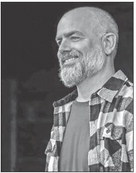Mall owner files claim aimed at city official


Abbotsford’s legal battle with the owner of the East Town Mall has taken a 180-degree turn in recent months.
At the end of April, attorneys for mall owner Lon Waldinger filed a countersuit against city administrator Dan Grady, accusing him of undermining multiple attempts to get new tenants into the mall.
In the April 28 counterclaim, Waldinger’s attorneys accuse Grady of engaging in a “civil conspiracy” to interfere with several potential lease contracts.
The complaint says Grady “repeatedly sought to divert new business development away from” the mall, “to the detriment of the city’s ostensible partners in the development agreement.”
When asked to respond, Grady said the accusations have no merit and are simply legal wrangling on the part of Waldinger and his attorneys.
Waldinger’s counterclaim comes after the city filed a lawsuit against him last September, accusing the mall owner of defaulting on the terms of a 2010 agreement in which the city obtained a $100,000 loan for him in exchange for certain improvements being made at the mall.
The attorneys point to three examples from early 2019 when Waldinger discussed plans with city officials to bring new tenants into the mall, only to have Grady allegedly turn around and negotiate alternate sites for the same or similar companies.
In the first instance, Waldinger says he was in discussions with Aspirus Clinic to possibly expand health care facilities at the mall. After sharing these discussions with Grady in January of 2019, Waldinger said Grady entered into negotiations with Marshfield Clinic about building a new clinic elsewhere in the city.
“I never spoke to Marshfield Clinic,” Grady said flatly on Monday.
Aspirus closed its FastCare Clinic at the mall in May of 2019, and city officials were briefly in discussions with Aspirus about building a stand-alone facility near STH 29, but nothing ever came of those discussions.
Grady noted that Aspirus decided to close all of its FastCare locations, not just the one in Abbotsford, because it “wasn’t fitting their business model.”
“We’d welcome Aspirus here, in any form,” he said. “Health care is one of the things we really need in this city.”
Also last year, Waldinger said he met with Grady to talk about bringing a pharmacy into the mall after learning that ShopKo had filed for bankruptcy.
According to the complaint, Waldinger met with representatives of the Health Mart pharmacy chain, toured the mall property with them and talked to them about leasing a space at the building.
Not long after, the city provided the owner of Abby County Market with a $130,000 loan in order to remodel a portion of the grocery store to fit a Health Mart pharmacy. The loan was made with tax incremental financing, which can be used to pay for projects within a half-mile outside the TIF district’s boundaries.
Grady said his conversations with Waldinger about the pharmacy were minimal. When Waldinger asked him for the phone number for Health Mart’s owner, Grady said he provided it.
“That’s the total extent I had,” he said.
The decision to establish a pharmacy at Abby County Market, rather than at the mall, was made by Health Mart’s owner, Josh Prohaska, Grady said.
“Lon’s claim is just outright false,” he said.
Abby County Market’s owner, Dave Hediger, came to the city to ask for a loan, but the location was arranged between Hediger and Prohaska, Grady noted.
“The deal had to work for both of them to make it happen,” he said.
Lastly, in the spring of 2019, the complaint says Waldinger and Grady met with Clark County’s economic development director to discuss the need for child care in the area. The attorneys say Grady “expressed disinterest” in working with their client on bringing a child care center to the mall.
Grady, however, says he “never spoke to Lon Waldinger about child care” facilities in Abbotsford. He said the topic came up at a meeting of the local chamber of commerce, but it was just “brainstorming.” Waldinger’s attorneys say Grady subsequently met with the chief financial officer of Abbyland Foods about building a child care center somewhere else in the city. Asked about this, Grady said these discussions were at a “30,000-foot level,” meaning they did not deal with anything specific. He said there were some initial discussions about putting a community center in the new subdivision with possible child care facilities, but nothing has been acted on.
“It wouldn’t stop anyone from going to Lon’s mall, and quite frankly, there would be enough child care need,” for more than one site, he said.
Waldinger’s attorneys accuse Grady of repeatedly using “information obtained under the auspices of a business relationship” with their client in order “to drive business development away” from the mall. The complaint says Waldinger suffered “financial harm” as the result of this interference.
Although the city itself may be immune from liability under state law, Waldinger’s attorneys argue that Grady “remains personally liable for his malicious, willful and intentional actions in furtherance of a civil conspiracy.”
The attorneys are asking that their client be awarded financial damages for the loss of rent and other damages resulting from the “civil conspiracy.”
In a response filed on May 15, the city’s attorneys deny any “civil conspiracy” on the part of Grady and say that he “acted in good faith” in a way that was consistent with state law and the city’s 2010 written agreement with Waldinger.
Regarding the three incidents in which Grady allegedly diverted business away from the mall, the city’s attorneys demand that Waldinger present proof of these accusations.
The attorneys deny that Grady or any other city officials conspired to drive business development away from the mall.
The background
In January of 2010, the city signed a agreement with Waldinger’s company, Chelt Development, offering him a $100,000 loan in exchange for completing five “required improvements” at the mall over a specified timeline.
Because the mall is located within a tax incremental financing (TIF) district, the goal was to use the additional tax revenue generated by those improvements to pay back the loan.
However, of the five “required improvements” included in the agreement, only one of them was completed — construction of a new space on the east side of the mall meant for a hardware store that never came to be.
Under the terms of the agreement, if Waldinger failed to make the improvements on time, he was required to either pay the city $50,000 or provide a “tax increment shortfall payment,” which would make up for any anticipated tax revenue that never materialized.
In 2010, the mall’s assessed value increased by $87,600 after the new east-end store space was built. That generated an extra $1,869 in property taxes that year, and, since then, taxes collected on that addition have totaled about $22,600, according to city documents.
From 2011 to 2020, the city made annual payments of about $12,600 on the $100,000 loan it got from the Wisconsin Commissioner of Public Lands in 2010. The final payment was made in March of this year, with the city having paid a total of $126,385 once interest was added in.
At this point, the $22,600 in tax increments generated since 2010 would not even be enough to cover the interest on the loan paid by the city. Based on the current mil rate, over $500,000 worth of improvements would be needed to pay back the loan amount over the next 10 years using TIF increments.
In the April 28 counterclaim, Waldinger’s attorneys say the improvements listed in the 2010 agreement were “merely projections” and described them as “vague.”
Although the attorneys acknowledge that the agreement “contained specifi c potential uses for the funds,” they claim that Waldinger was assured by city officials at the time that “no specific improvements were being required, thereby mutually modifying any written terms of the development agreement to the contrary.”
The city’s attorneys, however, say only the city council could have changed the terms of the agreement, and that never happened, so Waldinger is still legally obligated to comply with the 2010 deal.
Waldinger’s attorneys claim that he has made over $800,000 worth of improvements to the mall since the agreement went into effect, but the city has no building permits on record for any of that work.
Grady said he’s waiting until the case gets to the discovery phase, when the city can find out what proof Waldinger has for his claims.
“In the meantime, if Lon wants to make a settlement offer that makes us whole again, we’d be happy to accept it,” he said.

Dan Grady




